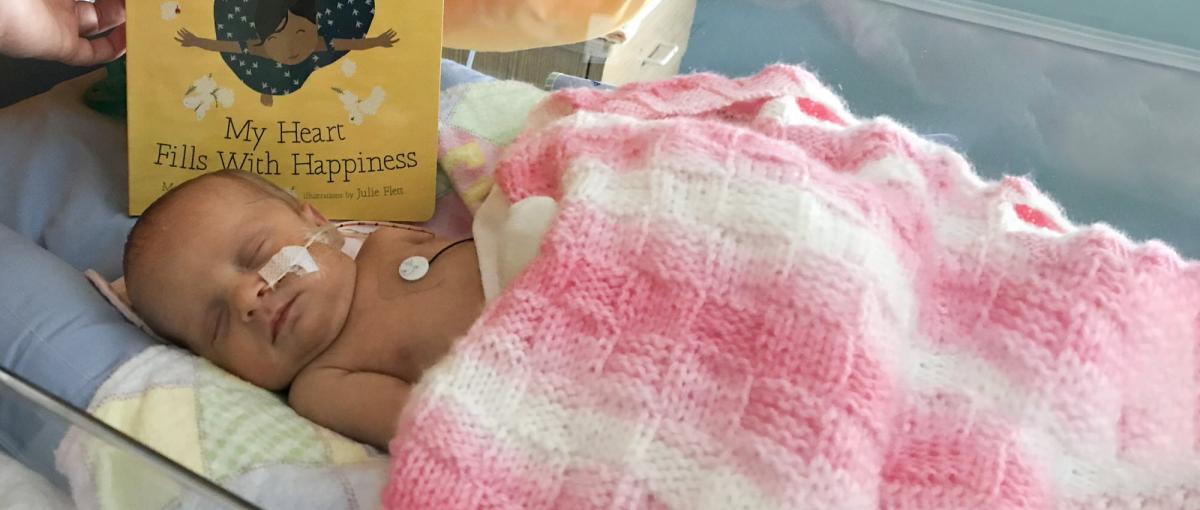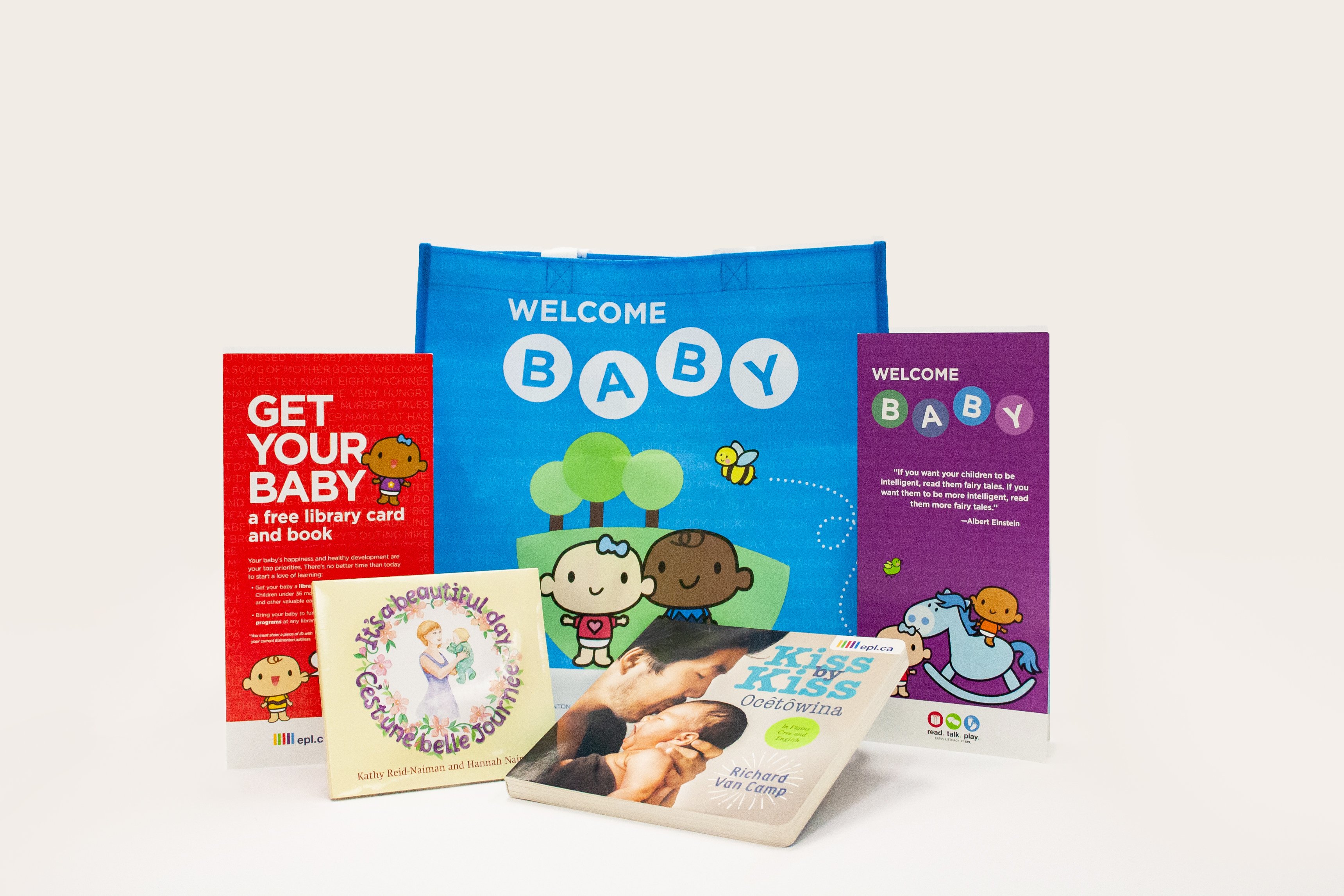The gift of literacy in the NICU
Newborns receive EPL's Welcome Baby package at Grey Nuns and Misericordia hospitals

September 9, 2019
By Lisa Brunelle, Communications Advisor, Covenant Health
Newborn Julianna is not ready to leave hospital, but her parents have already started reading to her.
Julianna was born nine weeks early and weighing about four pounds. She's doing well, but needs to hit a few more milestones, including being able to eat independently, before she goes home. In the meantime, her parents are connecting to their daughter in whatever ways they can while she’s in the neonatal intensive care unit (NICU) at the Grey Nuns Community Hospital That includes singing, talking and reading to her.
“With Julianna, we couldn’t start reading to her right away because she was in an isolette when she first came to the NICU,” says her mom, Alexandra Lischuk. “It took a little while, but I’ve been reading to her, listening to music and singing rhymes. I know a lot of rhymes because Julianna has a three-and-a-half-year-old sister at home.”
One of Julianna’s first books, My Heart Fills With Happiness, came courtesy of a program that’s been launched at the Grey Nuns and Misericordia community hospitals. Alexandra, who values reading, was happy to receive the package.
The Edmonton Public Library’s (EPL) Welcome Baby program puts books and early literacy materials in the hands of families. To help reach their target of getting these packages to all babies in Edmonton, EPL staff collaborated with Covenant Health teams to expand the program into the NICUs at the Grey Nuns Community Hospital and Misericordia Community Hospital in September. The Welcome Baby package materials give families resources they can use to support their child’s early literacy and brain development, and also helps with bonding.

The Welcome Baby package includes a book and CD from Canadian or local artists and information about early literacy and EPL.
Giving a gift of reading and encouraging literacy is important for everyone, but is particularly valuable for premature infants.
“Full-term babies in the womb hear language at critical times of brain development,” says Dr. Amber Reichert, Neonatologist. “When infants are premature in a NICU they do hear some language, but it’s significantly less and the sounds they hear are quite different.”
Research shows that parts of the brain for language, communications and social development are significantly different for full-term and preterm babies. Part of Amber’s work includes following up with youngsters after they’ve stayed in a NICU. At age 18 months, she’s found that as many as one-third to half of children born prematurely have fewer words compared with other children at the same age. They may have delays or challenges with speech development.
Research shows value of literacy
Research on infant brain development shows that a child’s experience in the early years directly affects later development and learning. With strong literacy skills, children are more likely to go further and succeed in school, find future employment, have a higher income and be healthier and happier throughout life.
“Infants in the NICU need to hear language at the right time, and that’s a bit challenging because these babies are much more medically fragile,” says Amber. “We have to be attuned to what the baby’s needs are and be able to communicate with them at the right time in the right way.”
“When we piloted the program in the NICU at the Royal Alexandra Hospital,” says Tamsin Shute, Librarian, Youth Services at EPL, “I got an email from a staff member in the NICU at the Misericordia Community Hospital asking when the program would come to their hospital. Staff at both hospitals have been so excited. They’re ready to support babies in another way.”
The Welcome Baby package and supporting posters remind staff and parents to talk to and interact with the babies in more than just a medical way to care for the whole person.
In the Welcome Baby training sessions, hospital staff learn about the importance of early literacy and why it’s important to start reading to babies right away—even when they’re in the NICU. They also learn about infant brain development and that premature babies need more language to support their brain development.
As part of the program, staff and families are encouraged to sing to babies.
“I never teach about early literacy without making everyone sing,” says Tamsin. “It’s not that hard, and babies don’t care what your singing voice sounds like.”
Amber says she doesn’t like singing in public, but she’s happy to do it for the babies in her care. She finds that singing a song can be a way to support a baby during caregiving that can be stressful to a fragile newborn, such as diaper changes or examinations.
At the Grey Nuns, volunteer cuddlers are also been encouraged to read, sing or talk to the babies while they cuddle them.
Talking, reading and singing supports development
As part of the program, staff at both hospitals will also help teach parents to look for signs that a baby is ready for some early literacy activities.
“This kind of talking and singing we’ll be doing with babies is more than soothing,” says Sharon MacKenzie, Registered Nurse in the NICU at the Misericordia Community Hospital. “By doing these things, we’re supporting the babies’ development.”
Alexandra thinks the Welcome Baby package will help families in the NICU because many aren’t expecting to have a baby who needs specialized care. The package provides them with comforting activities to do with their babies.
The program also supports families. “I think it gives families another sense of purpose. It’s something they can do in an otherwise uncontrollable environment,” says Lauren Roberts, Clinical Nurse Educator at the Grey Nuns Community Hospital. “It helps because it’s not focusing on the sickness; its focusing on something positive they can do.”
The program is very important to Amber.
“It’s my lifelong dream to walk into a NICU and see a neonatologist singing to a baby while doing an assessment or reading a book to a baby if they have a few extra minutes,” she says. “This would mean supporting language development of the babies in our care has become an integral part of our culture in the NICU.”